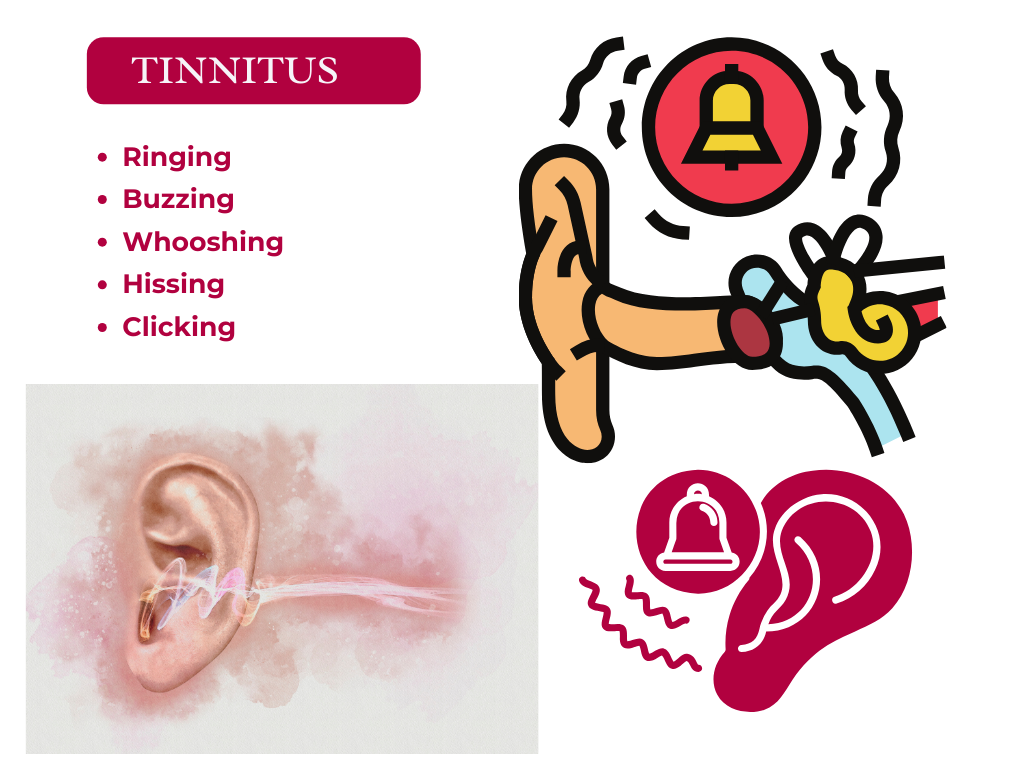All You Need To Know About Tinnitus

Tinnitus is the perception of sound when there isn’t any. It can sound like ringing, buzzing, whooshing, or other noises. It can be annoying and make it hard to concentrate or sleep.
Overview of the epidemiology and pathophysiology of tinnitus.
Epidemiology of Tinnitus
1. Prevalence: Tinnitus affects approximately 10-15% of adults worldwide.
2. Incidence: The incidence of tinnitus increases with age, with the highest rates found in individuals over 60 years.
3. Sex: Tinnitus affects both males and females, with a slightly higher prevalence in males.
4. Risk factors: Exposure to loud noise, age-related hearing loss, earwax buildup, ear infections, and certain medications are risk factors for developing tinnitus.
Pathophysiology of Tinnitus
-
1. Cochlear damage
Damage to the hair cells in the cochlea can lead to abnormal neural activity, resulting in tinnitus.
-
2. Neural plasticity
Changes in neural connections and strength can contribute to the development and maintenance of tinnitus.
-
3. Central gain
Increased gain in the central auditory system can amplify abnormal neural activity, leading to tinnitus.
-
4. Stress and emotional processing
Stress and emotional processing can contribute to the perception and severity of tinnitus.
-
5. Neurotransmitters
Imbalances in neurotransmitters such as serotonin, dopamine, and glutamate can contribute to tinnitus.
Theories of Tinnitus
-
1. The neural synchrony theory
Abnormal neural synchrony in the auditory cortex contributes to tinnitus.
-
2. The central gain theory
Increased gain in the central auditory system amplifies abnormal neural activity, leading to tinnitus.
-
3. The peripheral damage theory
Damage to the peripheral auditory system (cochlea, auditory nerve) leads to abnormal neural activity and tinnitus.
Key Brain Regions Involved in Tinnitus
-
1. Auditory cortex
The primary auditory cortex and surrounding areas are involved in processing abnormal neural activity related to tinnitus.
-
2. Amygdala
The amygdala is involved in emotional processing and can contribute to the perception and severity of tinnitus.
-
3. Hippocampus
The hippocampus is involved in memory formation and can contribute to the development and maintenance of tinnitus.
Aetiology of Tinnitus
Tinnitus can occur due to a number of possible reasons, including:
-
Noise exposure
Being exposed to loud noises, such as at concerts or sporting events, can cause tinnitus.
-
Hearing loss
Tinnitus is often linked to hearing loss, which can be caused by aging or exposure to loud noises (noise- induced hearing loss NIHL).
-
Medications
Some medications, such as non-steroidal anti-inflammatory drugs (NSAIDs), antibiotics, Quinine, antidepressants etc, can cause tinnitus.
-
Ear conditions
Earwax, ear infections, otosclerosis, or Meniere's disease can cause tinnitus.
-
Head or neck injuries
Traumatic brain injuries can damage the brain's auditory processing areas.
-
Tumours in middle ear
Such as glomus tumours can give rise to pulsatile to tinnitus.
-
Miscellaneous conditions
Tinnitus can be linked to high blood pressure, allergies, anemia, temporomandibular joint disorder (TMJ), diabetes, thyroid problems, and obesity.
-
Blood vessel issues
Changes in blood flow through the carotid artery can cause tinnitus.
Symptoms of Tinnitus
-
1. Ringing, Buzzing, or Other Sounds
Sounds can be constant or intermittent.
-
2. Volume and Pitch
Sounds can vary in volume and pitch.
-
3. Unilateral or Bilateral
Tinnitus can occur in one or both ears.
Diagnosis of Tinnitus
-
1. Medical History
A thorough medical history to identify potential causes.
-
2. Physical Examination
A physical examination to check for signs of earwax buildup, ear infections, or other conditions.
-
3. Hearing Tests
Audiological tests to assess hearing and identify potential hearing-related causes.
-
4. Imaging Tests
Imaging tests, such as CT or MRI scans, to rule out underlying conditions.
Treatment of Tinnitus
-
1. Sound Therapy
Exposure to soothing sounds to help mask tinnitus.
-
2. Cognitive Behavioral Therapy (CBT)
Therapy to help manage stress and anxiety related to tinnitus.
-
3. Tinnitus Retraining Therapy (TRT)
A combination of sound therapy and CBT.
-
4. Medications
Medications, such as antidepressants or anti-anxiety medications, to manage related symptoms.
-
5. Relaxation Techniques
Techniques, such as meditation or deep breathing, to manage stress and anxiety
Management of Tinnitus
-
1. Avoid Loud Noises
Protect your hearing by avoiding loud noises.
-
2. Manage Stress
Engage in stress-reducing activities, such as exercise or meditation.
-
3. Get Enough Sleep
Aim for 7-8 hours of sleep per night.
-
4. Stay Hydrated
Drink plenty of water to stay hydrated.
-
5. Avoid Stimulants
Avoid stimulants, such as caffeine or nicotine, that can exacerbate tinnitus.
Prognosis of Tinnitus
-
1. Variable
The prognosis for tinnitus varies depending on the underlying cause and individual factors.
-
2. Manageable
With proper management and treatment, tinnitus can be managed and improved.
Complications of Tinnitus
-
1. Sleep Disturbances
Tinnitus can disrupt sleep patterns.
-
2. Anxiety and Depression
Tinnitus can contribute to anxiety and depression.
-
3. Concentration and Memory Problems
Tinnitus can affect concentration and memory.
-
4. Social Isolation
Tinnitus can lead to social isolation.
When to Seek Medical Attention
-
1. Sudden Onset
If tinnitus starts suddenly, seek medical attention.
-
2. Pulsatile Tinnitus
If tinnitus is pulsatile (beats in time with the heartbeat), seek medical attention
-
3. Tinnitus with Other Symptoms
If tinnitus is accompanied by other symptoms, such as hearing loss, dizziness, or ear pain, seek medical attention.
Share Post On:
Recent Posts
-
Nuggets of ORL-OTOLOGY
-
Nuggets of ORL-RHINOLOGY
-
Nuggets of Otorhinolaryngology-Basic sciences
-
Anatomy of the Muscles of the Soft Palate
-
Ethmoidal Arteries Ligation for Epistaxis
-
Submucous Cleft Palate (SMCP)
-
Approach to Ligation of the External Carotid Artery
-
Approach to Managing a 3-Year-Old Boy with a Foreign Body in the nasal cavity.
-
Approach to Managing a 3-Year-Old Boy with a Foreign Body impacted in the ear canal.
-
Endoscopic Sphenopalatine Artery Ligation (ESPAL) for Epistaxis
-
Surgical Management of Epistaxis
-
Technique of Incision and Drainage of Septal Hematoma/Septal Abscess
-
Upper Aerodigestive Tract Foreign Body Impaction
-
Incision and Drainage of Hematoma Auris
-
Rigid Bronchoscopy for Retrieval of Foreign Bodies in Children
-
Foreign Body Impaction in the Larynx, Trachea, and Bronchi
-
Leadership Position is a Tool, not a Trophy
-
Carcinoma of the Oropharynx
-
Peritonsillar Abscess
-
Ethics of Doctor-Patient Relationship
-
Doctor-Patient Relationship Case Scenarios
-
Asymmetrical Tonsils and Approach to Evaluation and Management
-
Nasal Polyposis
-
Rigid Oesophagoscopy and Complication
-
Anatomy of Oesophagus
Categories
Get in Touch
Read doctor-produced health and medical information written for you to make informed decisions about your health concerns.

